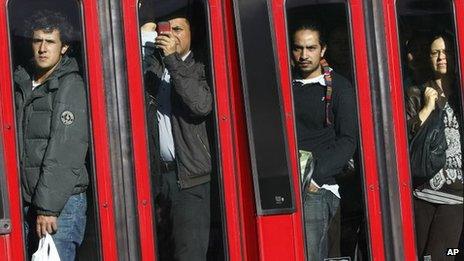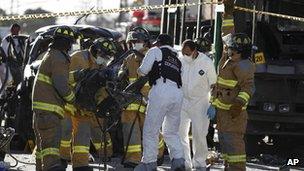Bombing revives Colombia's bitter memories of violence
- Published

Bogota residents are asking whether the bombing was a one-off
Only a couple of days have passed but the scene of the first deadly bombing in Bogota in three years already looks pretty much like any other busy spot in the Colombian capital.
There are a few broken windows and passers-by tend to stare at the site of the explosion, but otherwise it is business as usual at the corner of 74 Street and Caracas Avenue.
Pedro Salamanca is there, selling mangoes and papayas, as he has for the past five years.
He was doing the same when the bomb went off on 15 May.
Two people were killed and dozens injured, including Fernando Londono, a former interior minister who, according to the authorities, was the intended target.
"I was here, working, when I heard the blast," Mr Salamanca, 65, told the BBC.
"We hadn't had bombs like these for several years," he said.
For many Bogotanos, the attack brought back memories of the many bombings ordered by drug baron Pablo Escobar in the late 1980s and early 1990s.
Since then the tactic has also been widely used by rebels from the Revolutionary Armed Forces of Colombia (Farc), but the Colombian capital had not been hit as badly in a long time.
And in this case it is proving much more difficult to determine who is to blame.

It is still not clear who was behind the attack
The guerrillas were quickly accused of being responsible for Tuesday's attack by a police commander.
But shortly afterwards President Juan Manuel Santos adopted a more cautious approach.
"We don't know who is behind this attack," said Mr Santos.
"But this government will not be thrown off course by the terrorists," he added.
Mr Santos' caution is a good indicator of how much is at stake.
His political rivals, especially those to his right, like former president Alvaro Uribe, are using the attack to lambaste his security policies.
Mr Londono, a close ally Mr Uribe, is himself fiercely critical of Mr Santos' willingness to consider a negotiated solution to the long-running civil conflict.
Back to routine
If the Farc are indeed responsible, the Colombian president might have to kiss goodbye any possibility of dialogue.
Such an outcome, however, would go against the rebels' declared intentions.
It is difficult to establish whether the Farc really want peace, but they have certainly been pushing for peace talks.
And for many analysts this means the extreme right groups opposed to the talks cannot be ruled out as potential perpetrators of the bombing.
"The aim is to bring the country to a state in which talking about a negotiated peace is simply no longer possible," said Ivan Cepeda, a deputy from the leftist Polo Democratico party.
"It's obvious there are forces that are against the possibility of peace," he told the BBC.
In the meantime, as the investigation progresses, the Colombian government is not taking any chances.
The streets of Bogota are filled with police searching vehicles and pedestrians.
Among other security measures, an anti-terrorist committee for the Colombian capital has been set up.
Another group will have the job of identifying security risks to specific politicians.
The citizens of Bogota, however, are trying to get back to normal.
"I do feel unsafe, but we have to carry on, don't you think?" 20-year-old student Jessica Rincon told the BBC.
"You cannot let this sort of thing intimidate you, especially if you're a student and want to help to build a better, different country".
- Published16 May 2012